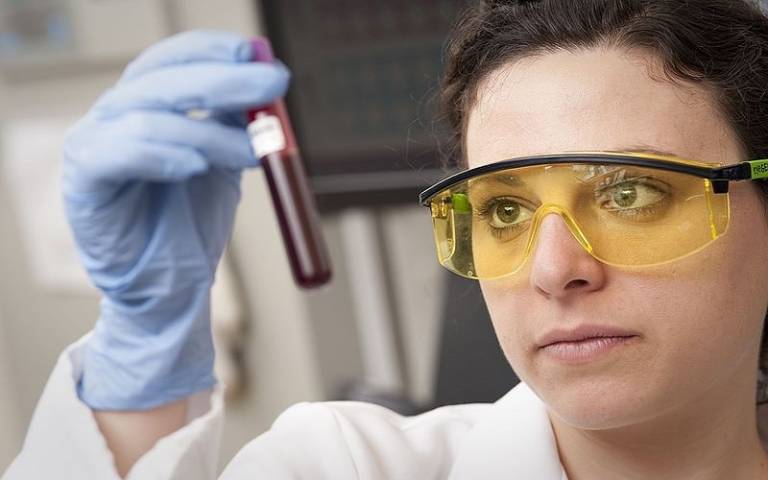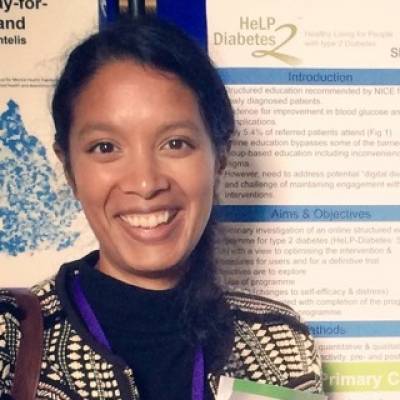Podcast: Where do I start if I'm interested in Pathology?
In part two of a two part medical special, Dr. Shoba Poduval returns to discuss careers in Pathology.

9 April 2024
Image credit: Wikimedia Commons
TRANSCRIPT
ROBERTA LIVINGSTON
Hello and welcome to Ask The Expert, where you ask the questions and UCL’s finest experts answer them. I’m your host Roberta Livingston, a schools engagement assistant at UCL East. Welcome back to Part Two with Dr. Shoba Poduval. Just a reminder we are answering this two part question: ‘If I am good at maths and biology and I want to go into neurosurgery and science, do I have to start out as an ordinary doctor, I’m also interested in Pathology, where do I start with this?’ If you haven’t listened to Part One which addresses the neurosurgery question feel free to have a listen to that too. In this episode, we will focus on how to get into Pathology, so let’s hear what Dr. Shoba Poduval has to say.
SHOBA PODUVAL
Pathology though is a little bit different. So Pathology again for those who don't know is more of a scientific speciality and it combines clinical and laboratory work. There are four main sub specialities within Pathology and those are Chemical Pathology, Hematology, Histopathology and Microbiology, and they all focus on slightly different things. I'm going to talk about Chemical Pathology and Histopathology as examples. So Chemical Pathology as the name suggests it's a lot of biochemistry. So you have two main roles. The first is leading a laboratory in the hospital. So that's where all the blood and tissue samples come in and as a chemical pathologist, you'd focus on the blood samples and there's hundreds if not thousands, probably at UCH (University College Hospital) that come in every day to measure things like people's blood counts, to see if they're anaemic, their liver function, et cetera. And those samples can come from the hospital or from GPs.
You're leading that lab so all those bloods are being processed by machines and there's lab technicians to supervise that, but you're in charge of all those lab technicians answering questions and supervising. And you're also providing
advice to doctors so as a GP I often call the labs that UCH and the other hospitals are working, just asking what the appropriate test might be, or asking about a result or checking for guidance with them. And so you're that port of call for blood tests.
Your second role is clinicals. You could you also work with patients to some degree who have diseases which involve metabolic disturbances. So for example, it might be a patient on a ward or an outpatient clinic who has a hormone disturbance or a genetic disease. So you work really closely with your colleagues in the hospital, both doctors and nurses and with GPS outside of the hospital. And you'll often be the only specialist of this kind in a smaller district General Hospital. So say you work outside of London in a smaller town or city. You might be the only chemical pathologist in the hospital, so it involves lots of receiving phone calls and your bleep going off generally being harassed by everyone and there's, but there's less out of hours working than in other specialities, particularly the neurosurgery which I've just talked about, you're not necessarily dealing with the same level of emergencies and you're not dealing with trauma and you're not going into theatre and that kind of thing. So it's slightly more regular hours.
And the kind of skills that you need for Pathology, some similarities to surgery, but some differences as well. Communication skills are really important because as I said, you're constantly getting calls and giving advice to colleagues and patients being able to stay calm, being able to work within a team because you're often going to be leading your lab and working with lots of different other types of doctors.
You need to be. You need to enjoy problem solving and working through problems and piercing the puzzle together, because that's what you're doing with blood test results and just generally being organised and good at decision making.
And there's two routes into. Oh, actually, let me talk about Histopathology first Histopathology is the study of organs and tissues and cells and genetics to help with diagnosis of illnesses. So you're in the lab looking at organ and tissue samples under a microscope and you learn. You first learn how to do that at medical school. But then when you go on to be a Historologist, you're doing, you're spending a lot of your time doing that. And that helps other doctors in the hospital to make diagnosis or to decide the prognosis. So to decide how severe an illness is or with cancers deciding what stage it's at, to understand what treatment people need and how long they may have to live and so most of your time is spent in a laboratory. Again, working as part of a multidisciplinary team. That includes lab technicians and doctors from other specialities. So for pathology in general. So this includes all the subspecialities. There's two routes in one is as a doctor and one is as a clinician scientist. So I'll go through both of those routes if you want to do it as a doctor. Again, you need those really good GCSEs really good A levels with chemistry and possibly also maths and biology is the same as neurosurgery and I didn't mention previously, but to get into medical school now, not only do you need to have those excellent A levels, but you also need to pass an admissions test and an interview also. So there's a couple of steps to getting in which everyone goes through to get into medical school and the competition for Pathology it's slightly less than neurosurgery, so the competition for speciality training places in 2021 there were sixteen applications for 11 places, so slightly less competition. Once you've completed medical school, as with neurosurgery and other specialities, you have to do your two year Foundation programme training where you do your six months placements, that's where you get your grounding. That's where you really get your confidence as a junior doctor.
After your foundation programme you can apply for speciality training to become a doctor in Pathology, which again takes a minimum of eight years, so again a long pathway. However, if you don't fancy doing it the medical route, you can take the scientific route and do it as a clinician scientist and this is increasingly becoming common in the NHS, where we're creating roles for people to support doctors working in hospitals, taking on some of the responsibilities that doctors previously had, but being able to train a different way, and it's actually really helpful because we all know we have a recruitment retention crisis in the NHS and difficulty hanging on to doctors, doctors move on and work elsewhere. So having alternative training pathways to fulfil some of these roles is really helpful for the NHS and to become a consultant clinician scientist, you need a strong educational background in science, so you need good grades in science. You need to get a good spread of GCSEs at grades eight grades A to C and relevant science A levels so chemistry and biology, for example, are really important.
And from there you can do an undergraduate course in clinical science or any form of science degree and then do a gradual entry training programme. And there's an NHS health careers website which takes you through this in more details. And I'll share the link for that. But essentially you start with a scientific training programme which lasts three years. So training includes a mix of academic study and practical work experience, and then you get a certificate of completion of scientist training and you can apply for a registration as a clinical scientist. And then there's higher specialist scientist training which is 5 years, and this is where your training your chosen speciality in Pathology and gain independence in providing expert advice to medical staff and managing a laboratory. And when you complete your training, you'll be ready to apply for a post as a consultant clinical scientist. So two levels that you can get to similarly to how doctors train.
So hopefully that's given you some ideas about how you get into those specialities. I just wanted to wrap up with some of general top tips for getting into medicine and deciding about specialities. If you do decide that becoming a medical doctor is for you, then great, we need more doctors. I really encourage people to do it. It's opened up lots of doors for me and it's been a really incredible life experience as well as career experience for me. Do start thinking early about building up a strong application, so even at GCSE level or even earlier starting to get work experience and that doesn't have to be in a hospital or a GP practise, it can be really difficult to get those opportunities, especially if you don't know people who are doctors or nurses, but even volunteering to help out at nursing homes or with children with disabilities, for example, at my school we were able on a Wednesday afternoon, instead of doing sports, we were able to go off and volunteer and I would help children with disabilities to go swimming. And I really enjoyed that and I could put that on my UCAS form as something that I did as a as a volunteering role. So start thinking about that think about your GCSE choices think about you’re a level choices. Make sure you're doing the right subjects to be able to get into the medical school that you want to get into.
Look at things like the admissions test and the interviews so you know early on what you need to do get lots of practise at doing those things. Talk to people from your school who've done it or other people that you can talk to who've done it to ask them what it's like. And then if you do get into medical school, congratulations, you've done really well. I encourage my students not to decide too early which specialty they want to go into because I think it's really important to stay open minded and to try and experience as much as you can before you make a decision and you have those first two years as a foundation doctor to go through those six months rotations and try different things before you have to make a decision. I did not think I was going to be a GP. All of my medical school career and it was only when I was a foundation programme doctor I always thought I wanted to be a psychiatrist actually And then I narrowed it down to Psychiatry or general practise and applied for both and then ended up doing general practise and I'm really glad that I did. Because I get to see lots of mental health as well as lots of other things as a GP, so I think it's really important to stay open minded and just really think about whether you want to go down the medical route or not first before making any other decisions.
ROBERTA LIVINGSTON
And so there you have it! There are two ways to get into Pathology so you’ll really have consider whether you’d rather go down the medical route or the scientific one.
And that is the end of this episode, I hope it was helpful! If you wish to submit your own question for an expert to answer just type in Ask The Expert UCL on your search engine and our website should be the first to pop up. Til next time! Thank you.
 Close
Close


